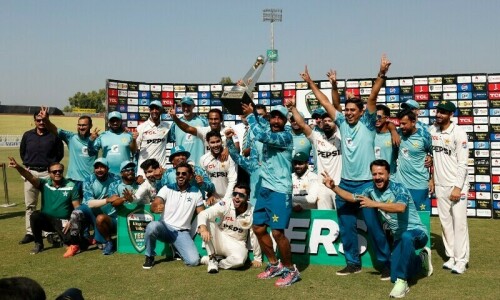Pakistan cricket rediscovered itself in the middle of a disaster Test series between Multan and Rawalpindi.
We were curious as to where Pakistan cricket had vanished. Pakistan is capable of making cricket a thrilling spectacle, the Pakistan of high drama and passion.
We witnessed series after series of disjointed strategy, selection, and performance that lacked soul. And we questioned, “Is this it?” Is this us, the international cricket middle-of-the-pack mediocres?
The events of the past two weeks were both exhilarating and joyful. Knowing that Pakistan cricket’s spirit had not vanished despite years of self-destruction brought joy. It existed.
hidden behind a cover of poor management and enormous egos. Pakistan, led by Shan Masood, batted coarsely, bowled aggressively, and fought for every inch of advantage.
Shan isn’t Mike Brearley, but he might be the best person for the job. But most importantly, this was a Pakistan team that played to a match strategy and executed it fervently, taking advantage of being at home. The cult of the hero has been taken to an absurd extreme, and for far too long, the plan has appeared to be nothing more than delegating it to Babar Azam or Shaheen Shah Afridi. We were convinced that only the usual suspects could represent Pakistan because of this self-deception.
The decision to eliminate Babar, Shaheen, and Naseem Shah was bold but logical. The stars of Pakistan no longer had an impact on games. The results of both subjective and statistical analysis pointed in the same direction. Australia, the nation that has had the most success in cricket this century, is absolutely ruthless: No matter who you are, you can’t play if you don’t perform. Once you reach a certain level in Pakistan, you always play, regardless of your performance.
The issue of leadership follows. Pakistan cricket lacks great leaders. Babar and Shaheen were inept captains, but when Shan took over, their shadows hung over him. In their absence, having command of the team must have been beneficial to him. Although Shan isn’t Mike Brearley, he may end up being the best man for the job. Similar to how Mohammad Rizwan and Salman Ali Agha might work well together in white-ball cricket. Salman has unquestionably been Pakistan’s best player over the past two years, and Rizwan’s credentials are well-established.
Shan’s inclusion in the Test squad merits serious consideration. On this point, Shan still needs to prove himself, but he is unquestionably an improved batsman who is willing to be aggressive and attack the opposition. After leading Pakistan to a remarkable victory, he did not deserve the disrespect he received from Ramiz Raja in the post-match interview. Respect for Shan grew as a result of his mature and diplomatic response. Ramiz, on the other hand, was reduced.
Shan was the totem, and he was a clear sign of a bad strategy. He did not design it. When a new manager takes over in the Premier League, pundits are quick to inquire about the team’s identity. What will happen? Although Pakistani cricket has a mercurial identity, it is founded on aggressive spin bowling, gritty batting, high pace and reverse swing, and intense competitiveness. All of these things have disappeared in recent times as Pakistan cricket attempts to transcend its essence.



